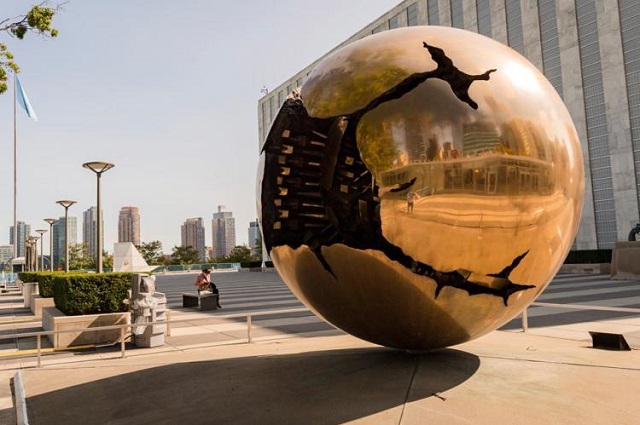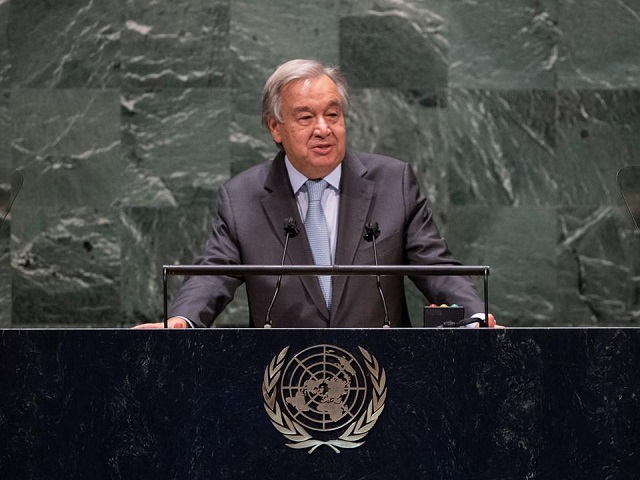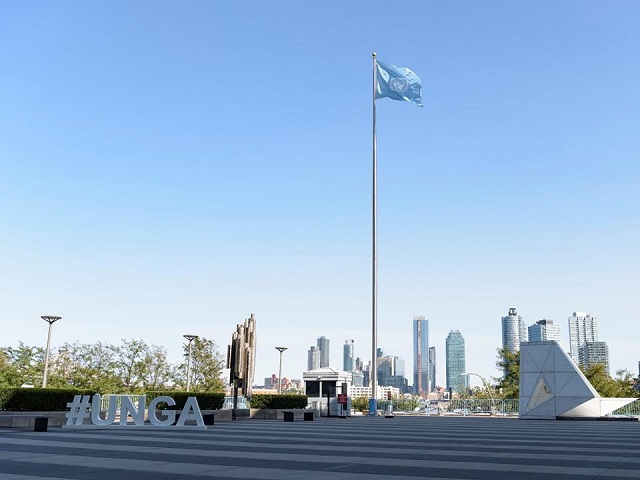Nations around the world gathered virtually for the 75th General Assembly of the United Nations. This historical gathering comes at a time when we are facing global challenges and global responses are difficult to find. The EU calls for a reform of multilateralism by design and not by destruction: “We must revitalize the system, not abandon it. So, this week and beyond, we will uphold the spirit of the UNGA and defend multilateralism, which all countries so badly need. A world without the UN would endanger us all.” stated High Representative/Vice President Josep Borrell.
The United Nations and its General Assembly have turned 75 this year The most relevant event for global diplomacy gains an added meaning when celebrating this achievement. However, the global pandemic has set a new world scenario and the General Assembly is not away from that.
This is the first time that the General Assembly of the UN was carried out via digital means. It demonstrates the capacity of the organisation to adapt in the name of the common good. And to not shy away from the global threats we are currently facing. Charles Michel, President of the European Council, also represents the EU at the 75th United Nations General Assembly.
The issues we are facing today have global dimensions. The pandemic has affected all countries, leaving the most vulnerable communities more exposed to the virus or its outcome. Taking the words of the Secretary-General of the United Nations António Guterres: “COVID-19 has laid bare the world’s fragilities. Rising inequalities. Climate catastrophe. Widening societal divisions. Rampant corruption.”
Read also
The EU stands with the UN. It is our shared belief that global challenges need to meet global solutions. To achieve them we can no longer count on the action of individual countries, but rather consider the multilateral tools we have available and work together.
EU High Representative Josep Borrell calls out for systemic challenges: “Everyday we see how narrow nationalism and strategic rivalries, especially between the United States and China, are paralyzing the UN Security Council and the wider international system. From climate change and arms control to maritime security, human rights, and beyond, global cooperation has been weakened, international agreements abandoned, and international law undermined or selectively applied.” These words are resonance by the Secretary-General of the United Nations António Guterres.
The intervention of global actors has amplified the concerns of the HR/VP Josep Borrell. Distancing themselves from their responsibility in maintaining a rule-based international order and promoting international feuds for domestic benefit does not contribute to overcoming common challenges.
“Today, we face our own 1945 moment.” highlighted Secretary-General António Guterres. In 1945, the world met an unprecedented need to rebuild the international system upon the shreds of two world wars. Today, we are facing a challenge that extends to all countries, together with a need to reform our multilateral system. It is now the time to understand that a response can only be achieved when the conditions are set for cooperation.
“A world governed by agreed rules is the very basis of our shared security, freedoms, and prosperity. A rule-based international order makes states secure, keeps people free and companies willing to invest, and ensures that the Earth’s environment is protected”, claims Borrell
The objectives set for the international system and the commitment made at the United Nations cannot be achieved by one country alone. They require collective actions, and for that, we need to be able to engage in collective dialogues.
The defence of Human Rights is still a battle fought on a daily basis. We are witnessing a gradual change towards the abolition of death penalty: in almost 90% of the countries in the world there was no execution last year. This is the result of joint commitments to value human life. EU Special Representative for Human Rights, Eamon Gilmore, reaffirmed EU’s position at the high-level side event on death penalty at UN General Assembly: “(…) unambiguous, strong and absolute opposition to capital punishment in all cases and under any circumstances”.
“We saw today how women are particularly affected by the death penalty in societies with a culture of widespread tolerance of violence against women. Especially women from poor socio-economic backgrounds.” highlighted Eamon Gilmore. Only through well-established international organisations, we are able to assess actions that put at stake the respect for Human Rights and call out for the protection of the most vulnerable.
EU-UN: partnership on COVID-19
The European Union has been fighting the COVID-19 outbreak inside and outside our borders. It is our true belief that cooperation is essential to mitigate the transmission and collateral effects of the response to the virus.
From providing protective and medical equipment, adapting ongoing projects to the current circumstances, to promoting research for a vaccine or activating an EU Humanitarian Air Bridge, all these demonstrate how the EU is at the forefront of the global response to the pandemic.
One of the lessons that we can take from this pandemic is that what affects one country has repercussions in the entire international system.
Together with its Member States, the EU is the largest donor to the World Health Organization. In 2019, EUR 146 million were donated to the organisation. Beyond funding, the EU has also taken a key role in defending the relevance of WHO. Whilst other global actors have questioned and even distanced themselves from the organisation, the EU has been reinforcing the need to come together to protect communities.
Protection of Human Rights, democracy and rule of law have been three key elements that the UN has been leading. The EU has provided its full support, particularly during this time when closer reach to communities is often limited, although even more necessary. The EU and its Member States have mobilised EUR 36 billion for partner countries to address the humanitarian, health, social and economic consequences of the crisis.
At the beginning of May, the EU sponsored a pledging conference for universal access to tests, treatments and vaccines against coronavirus and for global recovery. The EU’s action resulted in the contribution of close to EUR 16 billion from donors worldwide.
The EU-UN: a partnership that delivers
It is undeniable the close bond between the EU and the UN: we share core values and we are natural partners. This partnership leads the defence of multilateralism and of a rule-based international order. The origins of both reflect the need to encounter joint solutions and on the clear notion of the potential side effects of ignoring what others have to say.
Translating our commitment to practice, the EU and the UN are today working together in more than 170 countries. On EU-UN cooperation, the EU High Representative/Vice President Josep Borrell states: “We do so not just rhetorically, but also politically and financially, as well as diplomatically, by trying to act as a bridge-builder in the Security Council.”
The EU and the UN have a comprehensive agenda on the table that has to be delivered. Agreed objectives to combat climate change and improve humanitarian welfare stay on top of the agenda also in the face of the pandemic. The current circumstances add up to collective responsibility. For rebuilding a needed multilateral framework, for building back a safer, greener, more equal world.
European Union


























































